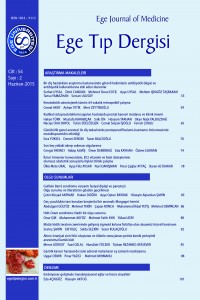Correlation of mid-trimester homocysteine, vitamin B12 and folate levels with adverse pregnancy outcomes: A clinical study
Abstract
Aim: The aim of this study is to determine if maternal serum levels of folate, vitamin B12 and homocysteine at 20-26 weeks of gestation are associated with subsequent adverse pregnancy outcomes. Materials and Methods: This prospective study was conducted in a tertiary care center and included 159 pregnant women at 20-26 gestational weeks. Complicated and uncomplicated pregnancy groups were compared in terms of serum levels of folate, vitamin B12, and homocysteine using Mann-Whitney U and t tests. Correlation of homocysteine with vitamin B12 and folate were analyzed with regression analysis. Results: Of the 159 participants, 32 (20.13%) suffered from pregnancy complications. There were no significant differences in the levels of the midtrimester homocysteine (p=0.25) and vitamin B12 (p=0.19) between healthy and complicated pregnancy groups. The significant difference in terms of folate levels (p=0.02) was considered to be clinically insignificant, since the measured levels were within normal range. There is a statistically significant inverse correlation between homocysteine and vitamin B12 levels (r = -0.407, p=0.013). Conclusion: Our results indicate that homocysteine, vitamin B12 and folate concentrations in mid-trimester are not associated with adverse pregnancy outcomes. These findings suggest that these markers seem not to have predictive value for pregnancy complications.
İkinci trimester homosistein, B12 vitamini ve folat düzeylerinin olumsuz obstetrik sonuçlarla ilişkisi: Klinik çalışma
Abstract
Amaç: Bu çalışmanın amacı, gebeliğin 20-26. haftalarında bakılan maternal serum folat, B12 vitamini ve homosistein düzeylerinin gelişebilecek olumsuz obstetrik sonuçlarla ilişkisini araştırmaktır. Gereç ve Yöntem: Bu klinik çalışma, üçüncü basamak bir merkezde gebeliğinin 20-26. haftasında olan 159 gebe üzerinde prospektif olarak yapıldı. Gebeliğin takibinde komplikasyon gelişen ve gelişmeyen gruplar, serum folat, B12 vitamini ve homosistein düzeyleri açısından t test ve Mann-Whitney U testi kullanılarak karşılaştırıldı. Homosisteinin, B12 vitamini ve folat ile korelasyonu için regresyon analizi kullanıldı. Bulgular: Takipte 159 gebenin 32'sinde (%20.13) gebeliğe bağlı komplikasyon gelişti. Normal ve komplike gebelik grupları arasında, ikinci trimesterde bakılan homosistein (p=0.25) ve B12 vitamini (p=0.19) açısından anlamlı bir farklılık bulunmadı. Folat düzeyleri açısından istatistiksel olarak anlamlı farklılık tespit edildimesine (p=0.02) rağmen sonuçların normal sınır aralığında olmasından dolayı klinik olarak anlamsız olarak yorumlandı. Homosistein ve B12 vitamini seviyeleri arasında istatistiksel olarak anlamlı şekilde ters korelasyon (r = -0.407, p=0.013) tespit edildi. Sonuç: Sonuçlarımız, ikinci trimesterde bakılan homosistein, B12 vitamini ve folat düzeylerinin gelişebilecek gebelik komplikasyonları ile ilişkisi olmadığını göstermektedir. Bu bulgulara göre homosistein, B12 vitamini ve folatın gebelik komplikasyonları konusunda prediktif bir değer taşımamaktadır.
Details
| Other ID | JA95GT93RU |
|---|---|
| Journal Section | Research Articles |
| Authors | |
| Publication Date | June 1, 2015 |
| Submission Date | June 1, 2015 |
| Published in Issue | Year 2015 Volume: 54 Issue: 2 |
Ege Journal of Medicine enables the sharing of articles according to the Attribution-Non-Commercial-Share Alike 4.0 International (CC BY-NC-SA 4.0) license.

